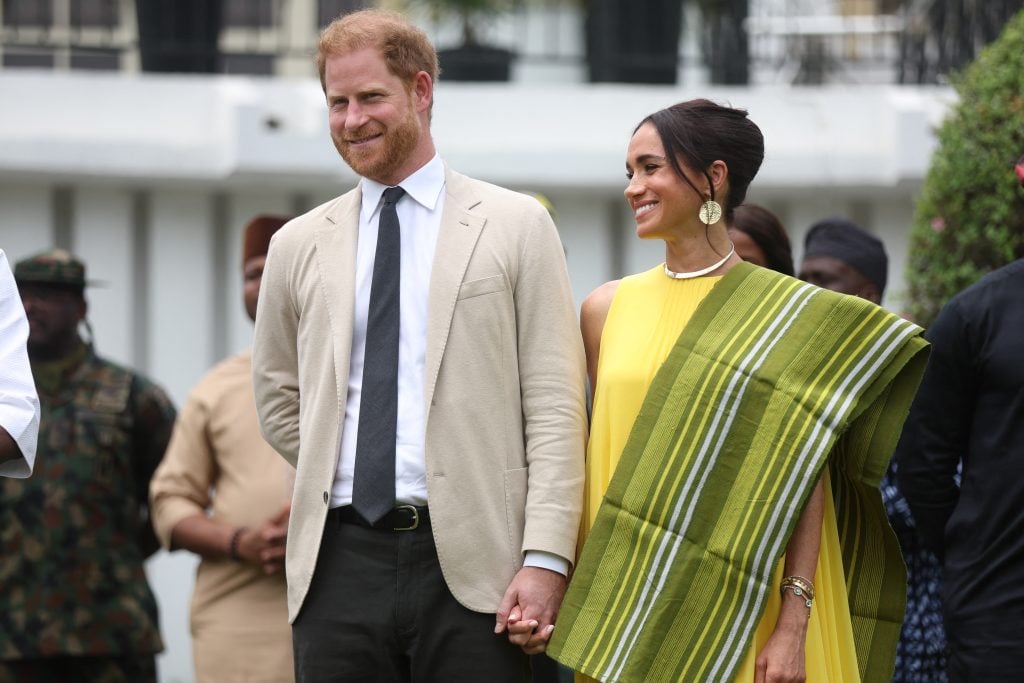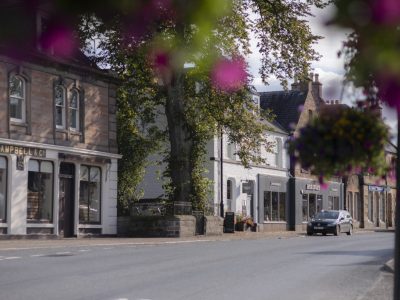In early May, Prince Harry, Duke of Sussex, and Meghan Markle, Duchess of Sussex carried out a three-day visit to Nigeria. The couple are no strangers to the African continent – prior to his marriage, Prince Harry carried out much humanitarian work including the launch of Sentebale in Lesotho, a charity to assist children orphaned by HIV/AIDS, and joined a team of volunteers in Malawi to carry out elephant relocations, while Meghan Markle travelled to Rwanda for the Clean Water Campaign as global ambassador for World Vision Canada. They last visited the African continent in 2019, where they undertook a Southern African tour of Malawi, Angola, South Africa and Botswana.
Since stepping back from the monarchy in 2020, Prince Harry and Meghan have continued to represent the monarchy abroad from their home in California. Their visit to Nigeria was at the invitation of the country’s chief of defence staff, General Christopher Musa, who stressed that they were invited in a ‘personal, not official capacity’, as the couple are no longer working royals, despite remaining members of the British royal family.
The visit was planned in connection with Prince Harry’s role as founder and patron of the Invictus Games Foundation which supports wounded and injured and sick servicepeople, both serving and veterans. Nigeria, which joined the Invictus Community of Nations in 2022, was the first African country to do so.
On the face of it, Prince Harry’s and Meghan Markle’s visit featured many hallmarks of a tried and tested royal tour, including visits to a school and a hospital, speeches, musicians showcasing local culture, and an evening dinner reception. Over the 72 hours they spent there, The Duke and Duchess met people from all walks of life, including schoolchildren, diplomats, and servicepeople.
Meghan’s “motherland”
Yet this was a unique royal visit like no other. The last royal tour of Nigeria was in 2003, carried out by the then Prince of Wales and Duchess of Cornwall. Yet unlike her parents-in-law, Meghan Markle, who is the first biracial member of the British royal family, has a personal connection to Nigeria. In an episode of her podcast Archetypes in 2023, Meghan revealed that she is ethnically 43% Nigerian based on a genealogy test she had taken, which led to her desire to further explore her Nigerian roots. Indeed, as Meghan Markle stepped off the plane hand-in-hand with Prince Harry, she became the first member of the British royal family with an ancestral connection to Nigeria to visit the country.
Unlike most of the British Royal family, Meghan Markle does not claim high-born ancestry. Her father is descended from Dutch, German, English and Irish immigrants to the United States. On her mother’s side, her American family were, only several generations ago, indentured slaves in North Carolina, with, as she has now discovered, Nigerian origins. While co-hosting a Women in Leadership panel with director general of the World Trade Organization, Ngozi Okonjo-Iweala, Meghan described learning about her heritage as “eye-opening”, and called Nigeria “my country” and “my motherland,” and thanked the people of Nigeria for “welcoming [me] home.”
Unlike all the royal tours which have come before, Prince Harry and Meghan Markle’s visit to Nigeria was first and foremost rooted in themselves, rather than an institution they represent, making it perhaps the most sincere and heartfelt of all royal tours on the continent to date – of which there have been many. The British Royal Family has a long and complicated relationship with the African continent stretching back centuries, which is firmly entwined with Britain’s history of colonial rule in many African nations.
Royals’ complex Africa history
The first official tour by a member of the British Royal Family to the continent was in 1860, when Prince Alfred, son of Queen Victoria, visited South Africa on HMS Euryalus. It was during his mother’s reign that the European “Scramble for Africa” grew in earnest, which saw European nations colonise many African countries, some of whom would not gain independence until close to the next millennium. In 1928, King Edward VIII undertook an ‘Official Imperial Tour to East Africa’ which saw him shoot what was then known as the ‘Big Five’ – a lion, an elephant, a rhino, a leopard, and a buffalo.
Towards the middle of the century, sub-Saharan African countries began to gain independence, starting with Ghana, which gained independence from Britain in 1957. The late Queen Elizabeth II had been staying in Kenya when she was told that her father had died and that she would now be Queen, and over the course of her reign, she visited the African continent twenty-one times, overseeing the independence process for many former British colonies. Her first visit to Nigeria was in 1956, four years before its independence, and she received a pledge of loyalty upon arrival on behalf of her then Nigerian subjects. In a marked contrast, her second visit in 2003 was to attend the Commonwealth Heads of Government Meeting, Nigeria having joined as a member in 1960.
Several royal visits to Nigeria followed over the years, including a tour by the former Prince and Princess of Wales in 1990, but Prince Harry and Meghan’s recent visit to the West African country strikes a completely different tone – that of authenticity. Unlike Prince William and Kate Middleton’s widely-derided Jamaican tour in 2022, which – with its failed optics of Jamaicans cheering the Royals from behind fences – led critics to accusations of colonial-style arrogance, Prince Harry and Meghan Markle’s Nigerian tour struck all the right notes.
From Harry donning a Nigerian scarf and joining in a game of volleyball, to Meghan who, after being presented with a bouquet of roses by a young girl, offered her one of the roses to keep as a memento, the trip was peppered with human touches.
Their itinerary was packed with promoting causes dear to their hearts, including mental health, women’s empowerment, and sports, and their enthusiasm was clear to see. The royal visit was lauded in the Nigerian press as a success, with Punch describing Kaduna State Governor, Senator Uba Sani, as “delighted to receive Harry”, and Vanguard stating that “Harry and Meghan’s visit to Nigeria carried a lot of symbolisms which must not be lost”, describing the couple’s visit as “a true reflection of the populist activities of [Harry’s] late mother, Princess Diana, fondly known as the “Queen of Hearts.”
After their return back to America, the couple posted on their social media, thanking ‘the Nigerian community for their tremendous hospitality and the first of many memorable trips.’
It seems that this Nigerian tour may in fact be the first of many more for Prince Harry and Meghan Markle, as they continue to carve out their own unique role within the royal family.










